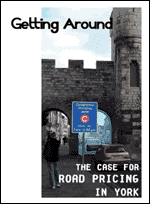
Page 1 Last updated Jan 2008 |
Getting Around
Road pricing as part of a wider transport strategy can offer us a cleaner, safer and healthier city, as well as faster and more reliable journeys for those that have to be made.In 2000, 35 years after it was first recommended as a solution to urban congestion(1), the Government passed legislation allowing local councils to charge for the use of congested roads. Five years later and despite the seeming success of the London Congestion Charge(2), outside of London only one road(3) is subject to a similar charge. A referendum in Edinburgh(4) saw congestion charging overwhelmingly rejected. Here in York it has been kept off the agenda(5). But the crush for scarce road space does not go away; it is getting ever worse. The Government is now discussing a system of national road pricing based on satellite tracking(6). However, the problems of congestion are felt locally and detailed local information will be needed to devise a solution. A local congestion charge stands a far greater chance of tackling the problem effectively, and using the money raised to create better public transport for the city. Road user charging could also go some way toward paying for the enormous environmental and social damage caused by road transport: a bill which, in spite of the popular sentiment that motorists are unfairly taxed, is currently going unpaid(7). Such a system would need to be fair, yet not worsen the situation of those living on low incomes. It could encourage us to make better use of limited resources we share: fuel, clean air and road space. If implemented well, everyone stands to gain.
Notes and References1. "...a now retired civil servant told me that as a young man he found in the Ministry of Transport files a note, in the personal hand of the Prime Minister, Sir Alec Douglas Home, saying 'let us take a vow that if we are re-elected we will never again set up a study like this one'." - from his inaugual lecture for the Professorship of Transport Policy, "SOLVING CONGESTION (when we must not build roads, increase spending, lose votes, damage the economy or harm the environment, and will never find equilibrium)". The Smeed Report is downloadable for free from UKís Transport Research Laboratory. 2. I use the word "seeming" as there are critics who argue that the implementation cost of the scheme has outweighed the benefits to the public purse - see "The London congestion charge: a tentative economic appraisal", Rémy Prud'homme and Juan Pablo Bocarejo (University Paris XII, France) 3. 4. 5. 6. 7. |